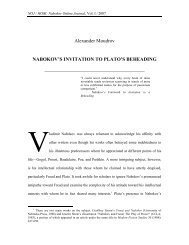domesticated translation: the case of nabokov's translation of alice's
domesticated translation: the case of nabokov's translation of alice's
domesticated translation: the case of nabokov's translation of alice's
You also want an ePaper? Increase the reach of your titles
YUMPU automatically turns print PDFs into web optimized ePapers that Google loves.
N. Vid. “Domesticated Translation”<br />
Russian original or clarified historical, social and cultural issues <strong>of</strong> <strong>the</strong> nineteenth<br />
century, but also provided biographic material about Pushkin, references to Russian and<br />
European literature, etc. Nabokov’s intention to reveal <strong>the</strong> complicated world <strong>of</strong><br />
Pushkin’s genius resulted in a pr<strong>of</strong>ound and extensive scientific work which can hardly<br />
be designated as a mere <strong>translation</strong>.<br />
Alice’s Adventures in Wonderland remains <strong>the</strong> only novel for children translated<br />
by Nabokov. Summarizing Nabokov’s main achievements in this <strong>translation</strong>, it should be<br />
mentioned that while he familiarized <strong>the</strong> foreign cultural context and focused on <strong>the</strong><br />
target audience, his <strong>translation</strong> <strong>of</strong> Alice did not underestimate children’s ability to<br />
comprehend. The author sacrificed some “technical” elements to make his <strong>translation</strong> <strong>of</strong><br />
Carroll’s story accessible to younger audience. Nabokov followed <strong>the</strong> main strategy <strong>of</strong><br />
domestication (realized in <strong>the</strong> text as substitution and localization throughout <strong>the</strong> whole<br />
story), avoiding cultural misinterpretations and culturally paradoxical scenes. The literary<br />
value <strong>of</strong> Nabokov’s <strong>translation</strong> is evident in <strong>the</strong> meticulous interpretation <strong>of</strong> puns and<br />
<strong>the</strong>ir basic sense, verbal plays, parodies, style, and intentional misunderstandings as well<br />
as his ability to catch <strong>the</strong> ironic nonsense and intentional absurdity <strong>of</strong> Carroll's world. If<br />
children’s appreciation <strong>of</strong> <strong>the</strong> final result is to be considered a translator's ultimate<br />
yardstick, <strong>the</strong>n Nabokov undoubtedly produced a successful <strong>translation</strong> <strong>of</strong> one <strong>of</strong> <strong>the</strong><br />
most challenging children’s writings in modern literature.<br />
REFERENCES<br />
Brower, A. R. On Translation. New York. Oxford University Press, 1966: 5.
















